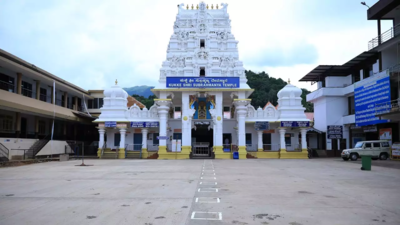Top Searches
- News
- City News
- bengaluru News
- 25 temples in Karnataka race for ‘zero waste’ tag
25 temples in Karnataka race for ‘zero waste’ tag

Kukke Sri Subrahmanya temple
BENGALURU: The Karnataka government has decided to walk the talk with regard to 'Cleanliness is next to Godliness': 25 A-Grade temples will be declared Zero Waste in the next five months.
Taken up under the Swachh Mandira Abhiyana banner, this concept envisages setting up waste processing plants inside temple premises and converting 'nairmalya' (waste) generated by temples every day into compost instead of sending it to landfills. Karnataka will be the first state to roll out the concept on such a large scale.
Of the 34,000 temples under the Hindu Religious Institutions and Charitable Endowments Department (muzrai dept), there are 201 A-Grade temples (with annual income exceeding Rs 25 lakh).
Waste project could be commissioned by Dec-end
Some temples with a high footfall of devotees are Kukke Subrahmanya Temple in Dakshina Kannada, Sri Kollur Mookambika Temple in Udupi, Sri Chamundeshwari Temple in Mysuru, Sri Nanjundeshwara Temple in Nanjangud, and Sri Saundatti Yellamma Temple in Belagavi district.
Each temple generates around three tonnes of waste daily, including flowers, banana leaves used for serving food, food waste, coconut shells, arecanut plates, lemons, bamboo baskets, clothes left behind, and even plastic products. "Under zero temple waste, there will be focused effort towards waste management. Most temples in Karnataka are in pristine locations and it is high time we prevented degradation of the environment there. We will streamline collection, transportation, treatment, and disposal of waste in these temples," said Rohini Sindhuri, commissioner for Hindu Religious Institutions and Charitable Endowments. She has been driving the project with muzrai minister Shashikala Jolle.
The government had allocated Rs 25 crore for waste management in 25 temples. Work has commenced in 21 and the project could be commissioned by December-end.
Rohini said the project not only brings about a behavioural change among people with regard to cleanliness but will also reduce damage to the environment. "As most offerings to the deity are biodegradable, it's prudent to convert it into compost instead of transporting it to landfills," she added.
Independent studies point to floral waste being a major contaminant in water bodies. While flowers rot and affect water quality, chemicals used on them leach and take a toll on marine life. "We'll convert waste flowers into organic manure," she added.
There are reports of temples putting in place robust waste management on their premises. In Bengaluru too, Sri Shakthi Kalyana Mahaganapathi Temple in Kalyan Nagar 1st Block had a compost unit. "Now, the big push is from the government itself in the state-owned temples. This also reduces dependency of temples on local urban bodies for disposal of waste," said another official.
Sri Banashankari Amma Temple is an A-Grade temple in the city that will be part of the project.
"Apart from infrastructure creation, temple staff, officers and committees will be sensitised on waste management," Rohini added.
Taken up under the Swachh Mandira Abhiyana banner, this concept envisages setting up waste processing plants inside temple premises and converting 'nairmalya' (waste) generated by temples every day into compost instead of sending it to landfills. Karnataka will be the first state to roll out the concept on such a large scale.
Of the 34,000 temples under the Hindu Religious Institutions and Charitable Endowments Department (muzrai dept), there are 201 A-Grade temples (with annual income exceeding Rs 25 lakh).
Waste project could be commissioned by Dec-end
Some temples with a high footfall of devotees are Kukke Subrahmanya Temple in Dakshina Kannada, Sri Kollur Mookambika Temple in Udupi, Sri Chamundeshwari Temple in Mysuru, Sri Nanjundeshwara Temple in Nanjangud, and Sri Saundatti Yellamma Temple in Belagavi district.
Each temple generates around three tonnes of waste daily, including flowers, banana leaves used for serving food, food waste, coconut shells, arecanut plates, lemons, bamboo baskets, clothes left behind, and even plastic products. "Under zero temple waste, there will be focused effort towards waste management. Most temples in Karnataka are in pristine locations and it is high time we prevented degradation of the environment there. We will streamline collection, transportation, treatment, and disposal of waste in these temples," said Rohini Sindhuri, commissioner for Hindu Religious Institutions and Charitable Endowments. She has been driving the project with muzrai minister Shashikala Jolle.
The government had allocated Rs 25 crore for waste management in 25 temples. Work has commenced in 21 and the project could be commissioned by December-end.
Rohini said the project not only brings about a behavioural change among people with regard to cleanliness but will also reduce damage to the environment. "As most offerings to the deity are biodegradable, it's prudent to convert it into compost instead of transporting it to landfills," she added.
Independent studies point to floral waste being a major contaminant in water bodies. While flowers rot and affect water quality, chemicals used on them leach and take a toll on marine life. "We'll convert waste flowers into organic manure," she added.
There are reports of temples putting in place robust waste management on their premises. In Bengaluru too, Sri Shakthi Kalyana Mahaganapathi Temple in Kalyan Nagar 1st Block had a compost unit. "Now, the big push is from the government itself in the state-owned temples. This also reduces dependency of temples on local urban bodies for disposal of waste," said another official.
Sri Banashankari Amma Temple is an A-Grade temple in the city that will be part of the project.
"Apart from infrastructure creation, temple staff, officers and committees will be sensitised on waste management," Rohini added.
FOLLOW US ON SOCIAL MEDIA
FacebookTwitterInstagramKOO APPYOUTUBE
Start a Conversation
end of article










